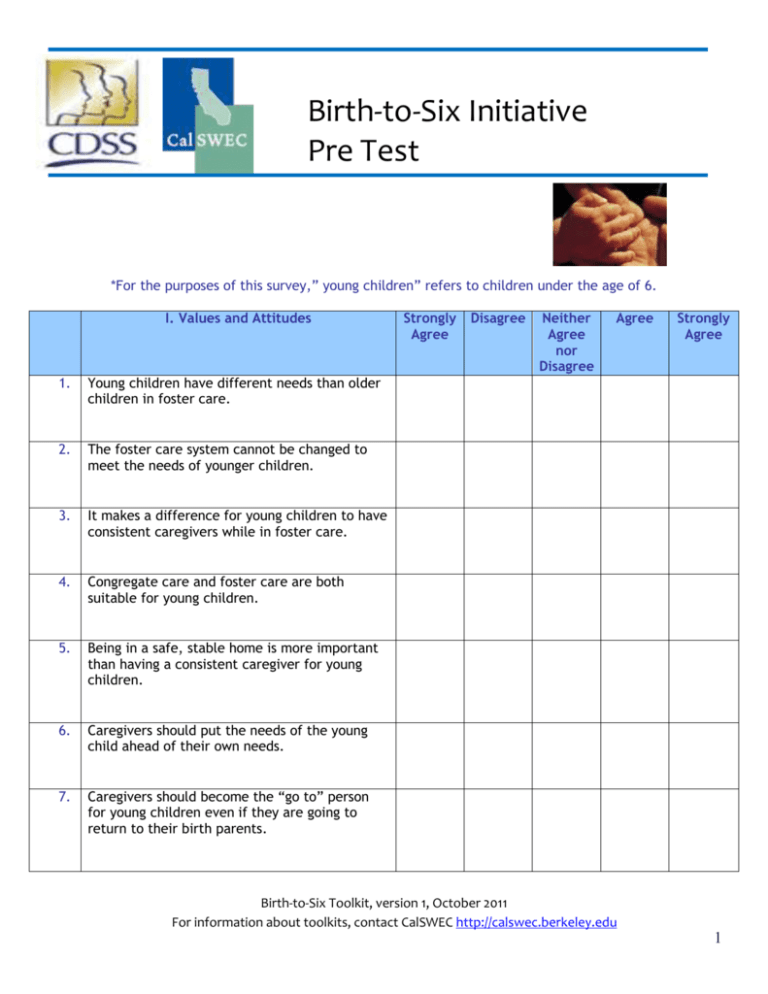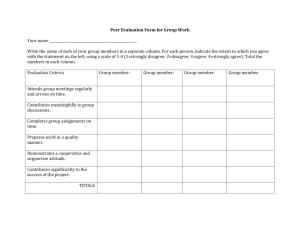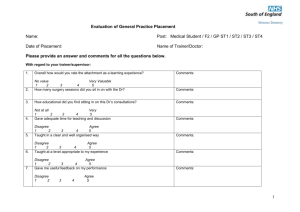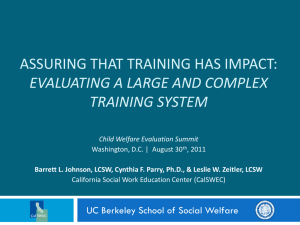Pre-test - CalSWEC
advertisement

Birth-to-Six Initiative Pre Test *For the purposes of this survey,” young children” refers to children under the age of 6. I. Values and Attitudes 1. Young children have different needs than older children in foster care. 2. The foster care system cannot be changed to meet the needs of younger children. 3. It makes a difference for young children to have consistent caregivers while in foster care. 4. Congregate care and foster care are both suitable for young children. 5. Being in a safe, stable home is more important than having a consistent caregiver for young children. 6. Caregivers should put the needs of the young child ahead of their own needs. 7. Caregivers should become the “go to” person for young children even if they are going to return to their birth parents. Strongly Agree Disagree Neither Agree nor Disagree Agree Strongly Agree Birth-to-Six Toolkit, version 1, October 2011 For information about toolkits, contact CalSWEC http://calswec.berkeley.edu 1 8. Young children really have no memory of the moves they make between homes. 9. An infant’s routine, such as feeding schedule and sleep schedules, should be maintained in the foster home as much as possible. 10. Adoption is the preferred permanent plan for young children. II. Knowledge Strongly Agree Disagree Neither Agree nor Disagree Agree Strongly Agree 11. Children under the age of six months have the ability to attach to multiple caregivers. 12. Bonding and attachment occur in children under the age of three. 13. The negative affects of neglect and abuse on attachment and bonding cannot be mitigated through social work interventions. 14. Young children are not impacted by multiple moves like older, school age children are. 15. Early identification of developmental delays can improve the likelihood that the child will get the treatment that is needed. 16. Bonding is the process of forming an attachment. 17. The acts of holding, rocking, singing, feeding, gazing, kissing and other nurturing behaviors Birth-to-Six Toolkit, version 1, October 2011 For information about toolkits, contact CalSWEC http://calswec.berkeley.edu 2 help an infant bond with a caregiver. 18. Trauma in young children can cause eating problems, developmental delays and aggression. 19. Brain growth and development are most active in the early years. 20. Behavioral problems, trouble eating and sleeping difficulties can be signs of an attachment disorder. 21. Developmental and behavioral impairments are correlated with longer lengths of stay in care III. Practice Strongly Agree Disagree Neither Agree nor Disagree Agree Strongly Agree 22. Monthly visitations between parents and young children are adequate to maintain a parentchild relationship. 23. I encourage caregivers to remain present during parent-child visitations to help with the young child’s attachment. 24. I ensure young children are screened for attachment disorders and developmental delays. 25. I make referrals for services and interventions for the child when he or she is older. Birth-to-Six Toolkit, version 1, October 2011 For information about toolkits, contact CalSWEC http://calswec.berkeley.edu 3 26. Policies within the organization support my practice with young children. 27. I observe a young child’s behavior to determine if there are developmental delays or attachment concerns. 28. I ensure caregivers of young children provide a consistent, predictable pattern for the day. 29. As parents progress towards reunification, I encourage more frequent and lengthy parentchild visits. 30. Placement, custody and long term planning decisions are individualized for the child’s best interest. . Birth-to-Six Toolkit, version 1, October 2011 For information about toolkits, contact CalSWEC http://calswec.berkeley.edu 4









